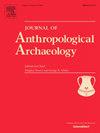古代埃博拉的烹饪编年史:公元前三千年叙利亚文明中饮食、营养和健康的多学科探索
IF 2.2
1区 社会学
Q1 ANTHROPOLOGY
引用次数: 0
摘要
1964年埃博拉病毒的发现彻底改变了我们对古代近东文明的认识,为我们提供了一个独特的机会,让我们得以一窥公元前3000年繁荣的复杂城市文化。尽管对埃博拉的行政和文化成就进行了广泛的研究,但其烹饪传统在很大程度上仍未被探索。本研究通过对历史记录和考古发现的综合分析,试图通过重建古代埃博拉的饮食习惯和营养实践来填补这一知识空白。通过整合食物生物化学、历史分析和文化背景的见解,我们对这个古老文明中食物、文化和幸福之间的复杂关系提供了细致入微的理解。我们的研究结果表明,饮食中富含完整的、最低限度加工的食品,强调当地的、时令的食材和传统的烹饪技术。这项研究强调了保护文化遗产和拥抱传统智慧在促进最佳健康和可持续性方面的重要性。我们的研究具有深远的意义,为促进当代人群的健康饮食习惯提供了一个令人信服的模型,并为现代营养和健康方法提供了信息。本文章由计算机程序翻译,如有差异,请以英文原文为准。

Culinary chronicles of ancient Ebla: A multidisciplinary exploration of diet, nutrition, and health in a 3rd millennium BCE Syrian civilization
The discovery of Ebla in 1964 revolutionized our understanding of ancient Near Eastern civilizations, offering a unique glimpse into the sophisticated urban culture that flourished in the 3rd millennium BCE. Despite extensive research on Ebla’s administrative and cultural achievements, its culinary traditions have remained largely unexplored. This study seeks to fill this knowledge gap by reconstructing the dietary habits and nutritional practices of ancient Ebla through a comprehensive analysis of historical records and archaeological findings. By integrating insights from food biochemistry, historical analysis, and cultural context, we provide a nuanced understanding of the intricate relationships between food, culture, and well-being in this ancient civilization. Our findings reveal a diet rich in whole, minimally processed foods, with a strong emphasis on local, seasonal ingredients and traditional cooking techniques. This study highlights the importance of preserving cultural heritage and embracing traditional wisdoms in promoting optimal health and sustainability. The implications of our research are far-reaching, offering a compelling model for promoting healthy eating habits in contemporary populations and informing modern approaches to nutrition and health.
求助全文
通过发布文献求助,成功后即可免费获取论文全文。
去求助
来源期刊

Journal of Anthropological Archaeology
Multiple-
CiteScore
4.00
自引率
11.10%
发文量
64
期刊介绍:
An innovative, international publication, the Journal of Anthropological Archaeology is devoted to the development of theory and, in a broad sense, methodology for the systematic and rigorous understanding of the organization, operation, and evolution of human societies. The discipline served by the journal is characterized by its goals and approach, not by geographical or temporal bounds. The data utilized or treated range from the earliest archaeological evidence for the emergence of human culture to historically documented societies and the contemporary observations of the ethnographer, ethnoarchaeologist, sociologist, or geographer. These subjects appear in the journal as examples of cultural organization, operation, and evolution, not as specific historical phenomena.
 求助内容:
求助内容: 应助结果提醒方式:
应助结果提醒方式:


